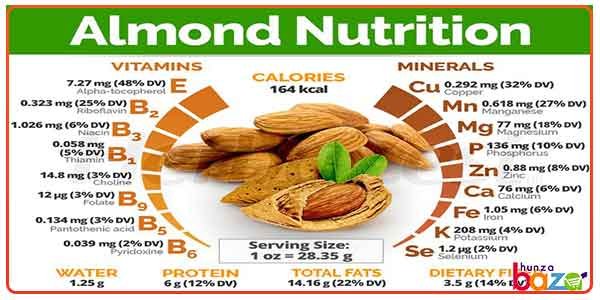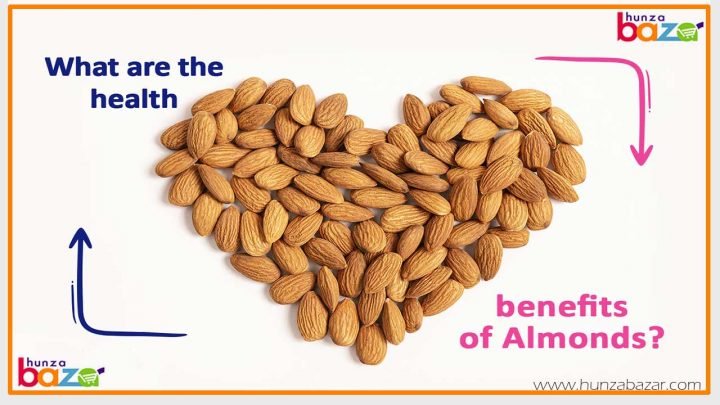Did You Know?
It is the seed of a tree in the nut rose family, from Southwest Asia. The tree is slightly larger and lives longer than the peach. It is amazingly beautiful when in flower. Nuts are either sweet or bitter. Sweet almonds are a type of food used as nuts and are used in cooking. Bitter almond oil is used to make flavors for food and wine. Almonds provide small amounts of protein, iron, calcium, phosphorus and B vitamins and are high in fat.
Do you love almonds? Specifically, do you love the taste of almonds? How about the nutritional value of almonds? If you answered yes to either question, then this blog post is for you! In this post, we’ll discuss everything from the health benefits of almonds to the different ways you can enjoy them. So sit back, relax, and enjoy reading about one of our favorite nuts!
What is Almond?

Almonds are a type of nut that is native to the Mediterranean region. The almond tree produces a drupe, which is a fleshy fruit with a hard stone at the center. The outer layer of the fruit is removed to reveal the edible kernel, which is encased in a thin brown skin. Almonds are rich in nutrients, including protein, fiber, and vitamin E. They are often used in baked goods and as a topping for salads and other dishes. In addition to being eaten whole, almonds can also be made into almond milk and almond flour.
Types of Almonds
Almonds are a type of tree nut that is native to the Mediterranean region. There are two main types of almonds: sweet almonds and bitter almonds.
1. Sweet Almonds:
Sweet almonds are the most common type of almond and are used in a variety of recipes, from almond milk to almond cookies. Million of people like to eat sweet Almonds.
2. Bitter Almonds:
On the other hand, bitter almonds contain a toxin called amygdalin, which can be poisonous if consumed in large quantities. However, bitter almonds are also used to make almond oil, which is used in perfumes and cosmetics. Mostly people used bitter almonds as a medicine for some diseases.
In addition, both sweet and bitter almonds can be roasted and eaten as a snack. So whether you’re looking for a tasty treat or a versatile ingredient, chances are that almonds could be the perfect option for you. (Buy Almonds)
Why are Almonds so Popular?
Almonds are a popular choice for both their taste and their health benefits. Almonds are a good source of protein, fiber, and vitamin E. They are also low in calories and saturated fat. Additionally, almonds have been shown to improve blood sugar control and reduce the risk of heart disease. Given all of these benefits, it’s no wonder that almonds are such a popular choice for both people and animals alike.
Almonds and Nutrition

As we mentioned before, almonds are a good source of protein, fiber, and vitamin E. Here is a more detailed look at the nutritional content of almonds:
1. Protein:
Almonds are a good source of protein, with 6 grams per ounce. This makes them a great option for vegetarians and vegans who are looking for a high-protein snack. Additionally, the protein in almonds is of a high quality, meaning that it is easily absorbed by the body.
2. Fiber:
Almonds are also a good source of fiber, with 3 grams per ounce. This helps to keep you feeling full after eating and can also aid in digestion.
3. Vitamin E:
Almonds are a good source of vitamin E, an important antioxidant. Vitamin E has been shown to protect cells from damage and may help to reduce the risk of certain chronic diseases.
4. Healthy Fats:
Almonds are a good source of healthy fats, including monounsaturated and polyunsaturated fats. These types of fats have been shown to improve blood cholesterol levels and reduce the risk of heart disease.
5. Minerals:
Almonds are also a good source of several important minerals, including magnesium, potassium, and zinc.
6. Calories:
One ounce of almonds (about 28 grams) contains 164 calories. This makes them a relatively calorie-dense food, but they are still lower in calories than other nuts such as cashews and peanuts.
Twenty Evidence-Based Health Benefits of Almonds

In addition to being a good source of nutrients, almonds have also been shown to offer a number of health benefits. Here are some of the most well-known health benefits of almonds:
1. May improve Blood Sugar Control:
Almonds may help to improve blood sugar control in people with type 2 diabetes. In one study, people with type 2 diabetes who ate 1 ounce of almonds per day for 16 weeks had lower blood sugar levels than those who did not eat almonds. Additionally, the almond group also had lower levels of HbA1c, a measure of long-term blood sugar control.
2. May reduce the Risk of Heart Disease:
Almonds may also help to reduce the risk of heart disease. One study found that people who ate 1 ounce of almonds per day had lower levels of LDL (“bad”) cholesterol and a higher level of HDL (“good”) cholesterol than those who did not eat almonds. Additionally, the almond group also had a lower risk of heart disease.
3. May Aid in Weight Loss:
Almonds may also help with weight loss. One study found that people who ate 1 ounce of almonds per day lost more weight and had a greater reduction in their waist size than those who did not eat almonds. Additionally, the almond group also had a lower risk of obesity.
4. May improve Skin Health:
Almonds may also help to improve skin health. One study found that people who ate a diet rich in almonds had a significantly lower risk of developing wrinkles than those who did not eat almonds. Additionally, the almond group also had a significantly higher level of skin moisture.
5. May protect against Cognitive Decline:
Almonds may also help to protect against cognitive decline. One study found that people who ate a diet rich in almonds had a significantly lower risk of developing Alzheimer’s disease than those who did not eat almonds. Additionally, the almond group also had a significantly higher level of cognitive function.
6. May Help Digestion:
Almonds may also help with digestion. The fiber in almonds can help to keep you regular and may also help to reduce the risk of constipation. Additionally, the healthy fats in almonds can help to reduce inflammation in the gut.
7. May Boost Immunity:
Almonds may also help to boost immunity. One study found that people who ate a diet rich in almonds had a significantly lower risk of developing respiratory infections than those who did not eat almonds. Additionally, the almond group also had a significantly higher level of white blood cells, which are important for fighting infection.
8. May Reduce the Risk of Cancer:
Almonds may also help to reduce the risk of cancer. One study found that people who ate a diet rich in almonds had a significantly lower risk of developing colorectal cancer than those who did not eat almonds. Additionally, the almond group also had a significantly lower risk of developing breast cancer.
9. May Improve Bone Health:
Almonds may also help to improve bone health. One study found that people who ate a diet rich in almonds had a significantly higher bone density than those who did not eat almonds. Additionally, the almond group also had a significantly lower risk of developing osteoporosis.
10. May Help with Pregnancy:
Almonds are a good source of folic acid, which is important for pregnant women. Folic acid can help to prevent birth defects of the brain and spine. Additionally, the magnesium in almonds can help to prevent preeclampsia, a condition that can be dangerous for pregnant women.
11. May Improve Brain Health:
Almonds are a good source of vitamin E, which is important for brain health. Vitamin E can help to protect the brain from cognitive decline and Alzheimer’s disease. Additionally, the magnesium in almonds can help to improve cognitive function.
12. May Help with Weight Loss:
Almonds are a good source of protein, which is important for weight loss. Protein can help to reduce hunger and promote fullness. Additionally, the healthy fats in almonds can help to boost metabolism and promote fat burning.
13. May Help Eliminate Cravings:
Almonds are a good source of fiber, which is important for eliminating cravings. Fiber can help to keep you feeling full and satisfied between meals. Additionally, the protein in almonds can help to control blood sugar levels and prevent cravings for sugary foods.
14. May Boost Energy Levels:
Almonds are a good source of magnesium, which is important for energy production. Magnesium can help to increase ATP production and promote muscle contraction. Additionally, the healthy fats in almonds can help to maintain cell membranes and improve cell function.
15. May Improve Heart Health:
Almonds are a good source of monounsaturated fats, which are important for heart health. Monounsaturated fats can help to reduce LDL cholesterol and promote HDL cholesterol. Additionally, the magnesium in almonds can help to improve blood pressure and reduce the risk of heart disease.
16. May Help with Stress Relief:
Almonds are a good source of magnesium, which is important for stress relief. Magnesium can help to relax the body and mind and reduce the effects of stress. Additionally, the tryptophan in almonds can help to promote serotonin production and improve mood.
17. May Reduce Cancer Risk:
Almonds are a good source of ellagic acid, which is important for cancer prevention. Ellagic acid can help to inhibit the growth of cancer cells and reduce the risk of cancer. Additionally, the flavonoids in almonds can help to protect DNA from damage and reduce the risk of cancer.
18. May Promote Digestive Health:
Almonds are a good source of fiber, which is important for digestive health. Fiber can help to keep the digestive system clean and reduce the risk of constipation. Additionally, the healthy fats in almonds can help to lubricate the intestines and promote regularity.
19. May Boost Human Bone Health:
Almonds are a good source of calcium, which is important for human bone health. Calcium can help to promote bone growth and reduce the risk of osteoporosis. Additionally, the phosphorus in almonds can help to strengthen bones and improve bone density.
20. May Help with Blood Sugar Control:
Almonds are a good source of magnesium, which is important for blood sugar control. Magnesium can help to improve insulin sensitivity and reduce the risk of type 2 diabetes. Additionally, the fiber in almonds can help to slow the absorption of sugar and keep blood sugar levels stable.
What are the Side Effects of Almonds?

While almonds are generally safe for most people, there are some potential side effects to be aware of.
* Upset Stomach:
Almonds can cause an upset stomach in some people. This is most likely due to the high fiber content. If you experience an upset stomach after eating almonds, try eating them in smaller amounts or soaking them in water before eating.
* Allergic Reactions:
Some people may be allergic to almonds. Symptoms of an allergy include itching, swelling, and difficulty breathing. If you experience any of these symptoms after eating almonds, seek medical attention immediately.
* Diarrhea:
Almonds can cause diarrhea in some people. This is most likely due to the high fiber content. If you experience diarrhea after eating almonds, try eating them in smaller amounts or soaking them in water before eating.
* Constipation:
Almonds can cause constipation in some people. This is most likely due to the high fiber content. If you experience constipation after eating almonds, try eating them in smaller amounts or soaking them in water before eating.
* Flatulence:
Almonds can cause flatulence in some people. This is most likely due to the high fiber content. If you experience flatulence after eating almonds, try eating them in smaller amounts or soaking them in water before eating.
* Bloating:
Almonds can cause bloating in some people. This is most likely due to the high fiber content. If you experience bloating after eating almonds, try eating them in smaller amounts or soaking them in water before eating.
* Nausea:
Almonds can cause nausea in some people. This is most likely due to the high fiber content. If you experience nausea after eating almonds, try eating them in smaller amounts or soaking them in water before eating.
* Vomiting:
Almonds can cause vomiting in some people. This is most likely due to the high fiber content. If you experience vomiting after eating almonds, try eating them in smaller amounts or soaking them in water before eating.
* Headache:
Almonds can cause a headache in some people. This is most likely due to the high magnesium content. If you experience a headache after eating almonds, try eating them in smaller amounts or soaking them in water before eating.
* Dizziness:
Almonds can cause dizziness in some people. This is most likely due to the high magnesium content. If you experience dizziness after eating almonds, try eating them in smaller amounts or soaking them in water before eating.
Benefits of Almond with Milk

Almond milk is a popular non-dairy milk alternative made from almonds. It is low in calories and fat, and contains no cholesterol or lactose. Additionally, almond milk is a good source of vitamin E, calcium, and magnesium.
Some potential benefits of almond milk include:
May Help with Weight Loss:
Almond milk is low in calories and fat, making it a good choice for those trying to lose weight. Additionally, the calcium and magnesium in almond milk can help to reduce the appetite and promote weight loss.
May Help Lower Blood Pressure:
The magnesium in almond milk can help to lower blood pressure. Additionally, the calcium in almond milk can help to relax the muscles and promote blood flow.
May Help Lower Cholesterol:
Almond milk is also low in cholesterol, which can help to reduce the risk of heart disease. Additionally, the calcium and magnesium in almond milk can help to lower cholesterol levels.
May Help Prevent Cancer:
The antioxidants in almond milk can help to protect cells from damage and prevent the development of cancer. Additionally, the vitamin E in almond milk can help to protect against the formation of tumors.
May Help Reduce Inflammation:
The magnesium in almond milk can help to reduce inflammation. Additionally, the calcium in almond milk can help to reduce the symptoms of arthritis and promote joint health.
There are many potential benefits of almond milk, which make it a healthy choice for those looking for a non-dairy alternative. Additionally, almond milk is a good source of vitamins and minerals that can help to promote overall health.
How to Enjoy Almonds?

Almonds can be enjoyed in many different ways. They can be eaten whole, raw, or roasted. Additionally, almonds can be used in baked goods, such as cookies and cakes. Additionally, almond milk can be used as a dairy-free alternative to milk.
When buying almonds, it is important to choose those that are fresh and have not been stored for long periods of time. Additionally, it is important to make sure that the almonds are not roasted or salted. When storing almonds, it is best to keep them in a cool, dry place.
Almonds are a healthy and versatile food that can be enjoyed in many different ways. By choosing fresh almonds and avoiding those that are roasted or salted, you can maximize the health benefits of this delicious nut.
Why Almonds are Good for Health? How are Almonds Good For You?

Almonds are a good source of healthy fats, proteins, and minerals. Additionally, they contain antioxidants that can help to protect cells from damage. Some potential health benefits of almonds include:
* Help Lower Cholesterol
* Help to Control Hair Fall
* Helps to Boost Immune System
* Helps to Prevent from Heart Diseases
* Helps in Pregnancy
* Good For Skin
* Good For Brain Functioning
* Reduce Inflammation
What is Almond Oil?

Almond oil is a type of vegetable oil that is extracted from almonds. It is high in monounsaturated fats and vitamin E, and has a variety of potential health benefits. Some potential benefits of almond oil include:
* Helping to Lower Cholesterol
* Helping to Prevent Heart Disease
* Reducing Inflammation
* Protecting Against Cancer
* Improving Skin Health
What is Almond Flour?

Almond flour is a type of flour made from almonds. It is high in protein and fiber, and low in carbohydrates. Additionally, almond flour is a good source of vitamin E, magnesium, and iron. Some potential benefits of almond flour include:
* Helping to Lower Cholesterol
* Improving Blood Sugar Control
* Reducing Inflammation
* Improving Gut Health
Different ways to Use Almond Flour
There are many different ways to use almond flour. Some common uses for this type of flour include:
Baking: Almond flour can be used in place of traditional flour when baking cakes, cookies, and other treats.
Coating: Almond flour can be used to coat chicken or fish before cooking.
Thickening: Almond flour can be used to thicken sauces and soups.
Almond flour is a versatile ingredient that can be used in many different ways. By incorporating this type of flour into your cooking, you can add a nutritious boost to any meal.
How to Eat Almonds / Different ways to Eat Almonds?
Almonds can be enjoyed in many different ways. They can be eaten whole, raw, or roasted. Additionally, almonds can be used in baked goods, such as cookies and cakes. Additionally, almond milk can be used as a dairy-free alternative to milk.
When buying almonds, it is important to choose those that are fresh and have not been stored for long periods of time. Additionally, it is important to make sure that the almonds are not roasted or salted. When storing almonds, it is best to keep them in a cool, dry place.
Almonds are a healthy and versatile food that can be enjoyed in many different ways. By choosing fresh almonds and avoiding those that are roasted or salted, you can maximize the health benefits of this delicious nut.
Some different ways to eat almonds are:
- Almond milk
- Almond butter
- Whole almonds
- Sliced almonds
- Chopped almonds
- Toasted almonds
- Raw almonds
How to Make Almond Milk?
Making almond milk is a simple process that only requires a few ingredients. To make almond milk, you will need:
- 1 cup of almonds
- 3 cups of water
- A blender
Instructions:
- Soak the almonds in water for at least 12 hours.
- Drain and rinse the almonds.
- Add the almonds and water to a blender and blend until smooth.
- Pour the milk through a cheesecloth or strainer to remove any chunks or pieces of almond.
- Store the milk in a container with a lid and refrigerate for up to 5 days.
(Note) Watch A Complete Video How to Make Almond Milk At Home
How to Make Almond Butter?
Making almond butter is a simple process that only requires a few ingredients. To make almond butter, you will need:
- 2 cups of almonds
- 1/4 cup of oil
- A food processor or blender
Instructions:
- Preheat the oven to 350 degrees Fahrenheit.
- Spread the almonds on a baking sheet and roast for 10-12 minutes, or until they are lightly browned.
- Allow the almonds to cool before adding them to a food processor or blender.
- Add the oil and process or blend the ingredients until they are smooth and creamy.
- Store the almond butter in a jar with a lid and refrigerate for up to 1 month.
How to Toast Almonds?
Toasting almonds is a simple process that only requires a few ingredients. To toast almonds, you will need:
- 1 cup of almonds
- 1 tablespoon of oil
Instructions:
- Preheat the oven to 350 degrees Fahrenheit.
- Add the almonds and oil to a baking sheet and stir to coat the nuts.
- Spread the almonds in a single layer on the baking sheet and roast for 10-12 minutes, or until they are golden brown.
- Remove the almonds from the oven and allow them to cool before serving.
- Store any leftover almonds in an airtight container at room temperature.
FAQs
Can Dogs Eat Almonds?
Dogs can eat almonds, but they should only be given in moderation. When feeding your dog almonds, it is important to remove the almond skin and chop the nuts into small pieces. Additionally, it is important to monitor your dog for any signs of allergic reaction, such as itching or swelling. If you notice any adverse reaction, stop feeding your dog almonds and contact your veterinarian.
Are Almonds Good For You?
Yes, almonds are good for you. They are a nutritious snack that can help you reach your daily recommended intake of vitamins and minerals. Additionally, almonds contain healthy fats that can help to improve your cholesterol levels. When choosing almonds, it is best to choose those that are fresh and have not been roasted or salted.
Are Almonds Healthy?
Yes, almonds are healthy. They are a nutritious snack that can help you reach your daily recommended intake of vitamins and minerals. Additionally, almonds contain healthy fats that can help to improve your cholesterol levels. When choosing almonds, it is best to choose those that are fresh and have not been roasted or salted.
How to Buy Almonds?
Many of peoples Asked questions how to buy Fresh & Spciy Almonds. And a lot of people either buy something bad when they buy it or buy it at a high price. Today I will tell you how you can recognize fresh almonds. First of all, go to one of your local shops where only dried fruits are kept. The advantage of buying from there is that this is their job so you will get dried fruit fresh and you will get cheap prices. Pick up some grains and sniff them once before buying. If it smells fresh, buy it. If it smells bad, don’t buy it at all and buy fruit from another shop. If You want to Buy from Online Shopping Stores then I recommend you to Buy From Our online Shopping Store (Hunza Bazar). We Sell 100% Fresh & Spicy Dry Fruits at Very Low Prices with Home Delivery. We’re not comproised in quality we try our best to sell 100% Pure Dry Fruits to our Customers.
How many Almonds in almond milk?
The amount of almonds in almond milk can vary depending on the brand and the recipe. However, most almond milks contain around 2-3% almonds by weight. This means that if you are using 1 cup (250 ml) of almond milk, it will likely contain around 5-7 whole almonds.
Can you eat too many almonds?
Yes, it is possible to eat too many almonds. While almonds are a healthy snack, they are high in calories and fat. Therefore, eating too many almonds can lead to weight gain. Additionally, if you have a tree nut allergy, eating too many almonds can trigger an allergic reaction. If you are unsure about whether or not you are allergic to almonds, it is best to speak with your doctor before consuming them.
Can Almonds kill you?
Eating large quantities of almonds can lead to gastrointestinal upset and toxicity. Although there have been no reported deaths from almond consumption, eating too many almonds can cause serious health problems. If you think you or someone you know has consumed too many almonds, it is important to seek medical help immediately.
Too many almonds can make you sick because they contain cyanide. Cyanide is a poison that can be fatal in high doses. However, the amount of cyanide in almonds is not usually high enough to cause serious health problems. However, if you eat a large quantity of almonds, you may experience symptoms such as nausea, vomiting, and dizziness. If you think you have eaten too many almonds, it is important to seek medical help immediately.
Bottom Line
Almonds are a healthy snack that can be enjoyed by both humans and dogs. However, it is important to monitor your dog for any signs of allergic reaction, and to avoid feeding them too many almonds. If you are unsure about whether or not you are allergic to almonds, it is best to speak with your doctor before consuming them.



